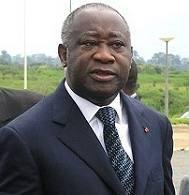Laurent Gbagbo was born in 1945 in the so-called ‘cocoa loop’ in the south-west. ‘When I went to school, rural Ivory Coast was still subdivided into military “circles” which were administered by French officers,’ he told me when I interviewed him in June 2009. ‘The economy was entirely in French hands: agriculture, trade, everything. Lawyers and even notaries were exclusively French. Throughout my secondary education, all but two of my teachers were French. It was against this overbearing reality that my generation rose in revolt. And yet it wouldn’t have occurred to me, once the time came to move on to college, to think of going to any place other than Paris. One of my daughters deliberately chose Germany and the other the United States. For me that would have been unthinkable. France was too much part of us.’ On the spur of the moment, the president started singing one of the hymns to France he’d learned in school. ‘La France est belle/ Ses destins sont bénis/Vivons pour elle/Vivons, vivons unis.’
He rounded it off with a burst of laughter and went on to talk about Charles Blé Goudé, the self-styled ‘general’ who’d been leading the pro-Gbagbo youth militia, the ‘young patriots’, since 2002. Blé Goudé, he explained, met his first white teacher when he went to study in England. ‘To England and not to France. It’s this generational shift that I call Africa’s quiet liberation. It’s natural, a gentle slope that will eventually set us free. As a politician I need to be in lockstep with the Ivorian youth because they’re the majority in our country. Nowadays, the better educated among them all learn English. Of course, they also speak French. But, to some extent, if I really want to be “in sync” with them, as they’d say, I need to forget a little of my French. Do you understand?’ It all made perfect sense. But in the summer of 2009, it was already clear that the gentle slope had become a sheer drop, and ‘the French’ a convenient excuse for the free fall of Gbagbo’s regime.
….
Gbagbo made more than one mistake. Having usurped a second five-year term (by failing to hold an election in 2005), he called the voters to the ballot boxes last November, when success seemed assured. By then, he had appointed a rebel leader as prime minister and was counting on state patronage to pave the way to victory. Nadiana Bamba, his second and far younger wife, was charged with winning over her home region in the north, but not only did ‘Nady’ fail to make inroads into Ouattara’s fiefdom, she spent more than a billion euros, two thirds of it unaccounted for. When the results of the first round came in, Gbagbo realised he couldn’t win the run-off, dismissed Nady, reinstated Simone with full conjugal and political rights, and signed an oil deal with Gunvor, a company controlled by the Russian Gennady Timchenko – the only trader who could raise a ‘pre-payment’ of $90 million. The state was already bankrupt, having tried to buy loyalties that were not for sale, and the money was destined for Gbagbo’s post-election war chest, and a fight to the death.
Thanks to Edoardo Totolo for the link.

